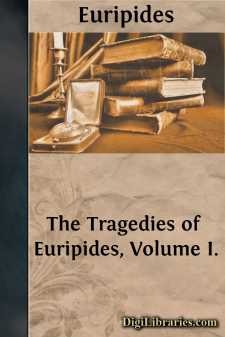Drama
- American 43
- Ancient, Classical & Medieval
- Asian 7
- Caribbean & Latin American 2
- Continental European 50
- English, Irish, Scottish, Welsh 91
- General 105
- Middle Eastern 1
- Religious & Liturgical 1
- Shakespeare 1
Ancient, Classical & Medieval Books
Sort by:
HUGH HENRY BRACKENRIDGE (1748-1816) The battle of Bunker's Hill was an event which stirred whatever dramatic activity there was in America at the time of the Revolution. Therefore, a play written on the subject should not be omitted from a collection supposed to be representative of the different periods in American history and in American thought. The reader has an interesting comparison to make...
more...
by:
Euripides
INTRODUCTION. Euripides, son of Mnesarchus, was born in the island of Salamis, on the day of the celebrated victory (B.C. 480). His mother, Clito, had been sent thither in company with the other Athenian women, when Attica was given up, and the ships became at once the refuge of the male population, and the national defense. Mr. Donaldson well remarks, that the patronymic form of his name, derived from...
more...
INTRODUCTION. Two of the dramas contained in this volume are the most celebrated of all Calderon's writings. The first, "La Vida es Sueno", has been translated into many languages and performed with success on almost every stage in Europe but that of England. So late as the winter of 1866-7, in a Russian version, it drew crowded houses to the great theatre of Moscow; while a few years...
more...
by:
Moliere
PROLOGUE MERCURY, on a cloud; NIGHT, in a chariot drawn by two horses MERC. Wait! Gentle Night; deign to stay awhile: Some help is needed from you. I have two words to say to you from Jupiter. NIGHT. Ah! Ah! It is you, Seigneur Mercury! Who would have thought of you here, in that position? MERC. Well, feeling tired, and not being able to fulfil the different duties Jupiter ordered me, I quietly sat...
more...
Act I. A Representation at the Hotel de Bourgogne. The hall of the Hotel de Bourgogne, in 1640. A sort of tennis-court arranged and decorated for a theatrical performance. The hall is oblong and seen obliquely, so that one of its sides forms the back of the right foreground, and meeting the left background makes an angle with the stage, which is partly visible. On both sides of the stage are benches....
more...
by:
Gilbert Murray
PREFACE If I have turned aside from Euripides for a moment and attempted a translation of the great stage masterpiece of Sophocles, my excuse must be the fascination of this play, which has thrown its spell on me as on many other translators. Yet I may plead also that as a rule every diligent student of these great works can add something to the discoveries of his predecessors, and I think I have been...
more...
by:
Nicholas Rowe
ACT THE FIRST. SCENE I. THE TOWER. Enter the Duke of Gloster, Sir Richard Ratcliffe, and Catesby. Glos.Thus far success attends upon our councils,And each event has answer'd to my wish;The queen and all her upstart race are quell'd;Dorset is banish'd, and her brother Rivers,Ere this, lies shorter by the head at Pomfret.The nobles have, with joint concurrence, nam'd meProtector of...
more...
by:
Aristophanes
SCENE: A farmyard, two slaves busy beside a dungheap; afterwards, in Olympus. FIRST SERVANT Quick, quick, bring the dung-beetle his cake. SECOND SERVANT Coming, coming. FIRST SERVANT Give it to him, and may it kill him! SECOND SERVANT May he never eat a better. FIRST SERVANT Now give him this other one kneaded up with ass's dung. SECOND SERVANT There! I've done that too. FIRST SERVANT And...
more...
by:
John Dryden
INTRODUCTORY NOTE The age of Elizabeth, memorable for so many reasons in the history of England, was especially brilliant in literature, and, within literature, in the drama. With some falling off in spontaneity, the impulse to great dramatic production lasted till the Long Parliament closed the theaters in 1642; and when they were reopened at the Restoration, in 1660, the stage only too faithfully...
more...
by:
Euripides
Introduction[1] The Electra of Euripides has the distinction of being, perhaps, the best abused, and, one might add, not the best understood, of ancient tragedies. "A singular monument of poetical, or rather unpoetical perversity;" "the very worst of all his pieces;" are, for instance, the phrases applied to it by Schlegel. Considering that he judged it by the standards of conventional...
more...











